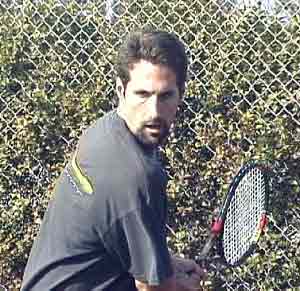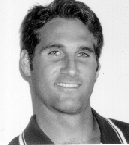|
Mental Toughness
What would change in your game if you loosened up and hit out on your shots? What if you added a dose of patience in your game and broke through the anxiety of needing to win the point too soon? How would this work for you?
What shot are you worried about or holding back on? For me, it's the backhand down the line and attacking second serves. Many players admit to playing too tight or losing focus in a match due to over thinking the score or impact of the match result. They typically go on to describe this as causing them to play tentatively where they force their shots to end the point early or just try to keep the ball in play. One client recently reflected on how much better he plays when he lets go of his thoughts and trusts his body. You could see the difference especially when he would return an out second serve. He could even do the same on a first serve when he was that relaxed. When this player just hit away without the tension of keeping the ball in and controlling his shots he would nail the ball perfectly over the net for a winner. One time when we were on the court I approached the net and asked him how he felt when he hit that out serve. He said, "I just hit it. I wasn't even thinking. The serve looked like it might be out so I just swung away. It felt great."
Another young junior I was working with who typically has quite a good forehand, was really struggling with it She was getting frustrated and really lost her rhythm in a workout. I asked her to stop thinking and to just swing away. In fact, I told her that we were going to create our own planet where missing didn't matter at all. She could hit as hard as she wanted and her goal was to have fun and just hit the ball without any thoughts. Within a minute, this player literally transformed her game. She had me running from side to side and her confidence was becoming almost tangible. With just a switch of the mind, this player stopped interfering with her strokes by letting go of her thoughts, which relaxed her body more and allowed her to swing away without the worry of missing. It was truly amazing even though I have seen this over and over again. When players let go and trust their body to do what it already knows how to
do amazing things happen. Taking the worry and excess thoughts out of the equation
allowed this player to stay focused on the ball and appreciate the joy of
just hitting while feeling relaxed enough to go for his shots. The Fear of LosingFearless Tennis addresses the second serve in the same way - playing loose and focused at the same time. Often, the second serve return is an opportunity players work long points to get (sometimes in 90 degree plus weather). Rarely, except at the pro level, is this ball coming so hard that you can't occasionally take at least some offense. And, if you are fortunate enough to have a weapon there is no reason why you can't step up and more than occasionally dictate this shot and immediately take control of the point; especially if you have strong ground strokes. Why do so few players really go after this shot? I believe it's because they are scared to miss. Have you ever, for example, taken an out serve and just relaxed and nailed it across the net? How would you play if you used this level of relaxed focus in competition? If you DO have the potential to hit through your shots more than you are now and aren't committing to this relaxed focus on a regular basis, I believe you have been victimized by the fear of mistakes and of losing.
If you are beginning to see some level of tightness and fear in your game you can be sure that this mind-set will keep you from reaching your
potential in the long run. When you choose safety over relaxed, aggressive Passive AttentionLet's look at this relaxed focus even closer. Typically this happens when players aren't trying so hard. It's called passive attention. Here, your body is relaxed and your mind intently focused and absorbed into watching the ball. This state of mind-body is about being present. You feel physically loose and are not thinking very much. Your mind is clear and hitting the ball is effortless. These internal feelings almost always translate to deeper shots, more power with less effort, and aggressive tennis.
About 15 years ago, my colleague and world-renowned sports psychologist, Dr. James E. Loehr,
discovered this exact phenomenon when interviewing the game's top players.
The reports from roughly 200 world-ranked players were nearly identical, pointing toward
the relaxed focus I am describing here. This work has been groundbreaking in the field of sports psychology and holds some of the gold
nuggets of information that you can begin using today. On the court you may have noticed that winning points was easy; that you didn't even have to try hard. It's amazing how relaxed the mind can becomes when you become absorbed in the moment and focus on exactly what is in front of you. You can learn to create this state of mind on demand if you want. This is available to you. The following seven steps can train you to help create this level of relaxed focus before competition.
Begin to notice your level of tension on the court by asking yourself on a scale 1-10 how relaxed you feel. Then, do the same with your focus. As you become more aware of your focus and tension level, you will get closer to your ideal performance state that is so critical to the zone we all know about. I am convinced you have more potential inside of you just waiting to come out. Swing loosely through the ball on big points and let your body do what it already knows how to do. You will win more and experience more satisfaction in the game. The above excerpt was taken from Mr. Greenwald's upcoming October release
of his cd audio program, Fearless Tennis, Six Mental Secrets to Winning Easy. TennisONE is an informational and instructional Website. Your feedback is important to us. Let us know what you think and what youíve learned by emailing us here at TennisONE.
Jeff Greenwald is currently ranked #1 in the world in both singles and doubles in the menís 35 age division and #1 in the United States in that age division by the International Tennis Federation and the United States Tennis Association respectively. In 1997, he was the #1 ranked tennis player in Northern California and was named Player of the Year by the USTA. Earlier, Jeff earned a world ranking as a touring professional (he is still ranked on the ATP computer), competing in scores of tournaments on seven continents. Jeff trained as a youth with John Austin and the late Tim Gullikson. He continues to compete in professional tennis tournaments worldwide, employing and testing the techniques and behavior patterns he teaches in classrooms, boardrooms, and on the playing fields. Jeff holds a Master's Degree in Clinical and Sports Psychology, is a USPTA certified tennis professional, and is a member of the National Speakers Association. Readers are encouraged to email their thoughts to the author at jgedge@attglobal.net.
|
Last Updated 11/15/01. To contact us, please email to: webmaster@tennisone.com TennisONE is a registered trademark of TennisONE and SportsWeb ONE; Copyright 1995. All rights reserved. |
|||||||||||||||||||||||




